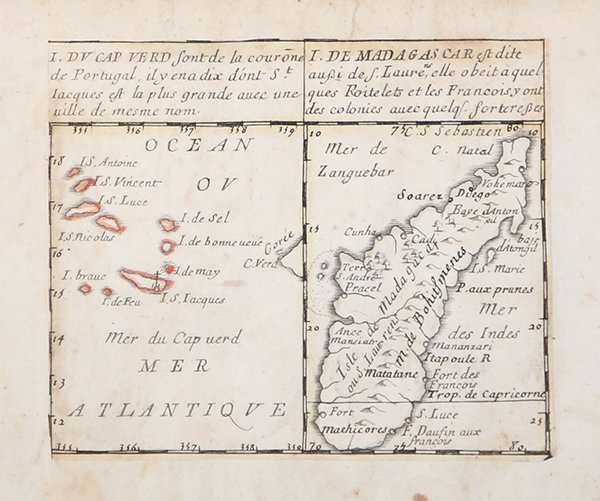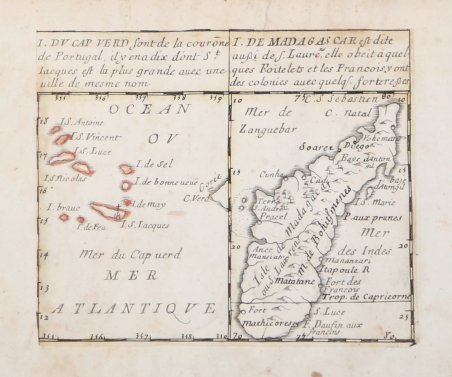Acquaforte, 1656 circa, con coloritura coeva dei contorni, in buone condizioni.Esemplare del secondo stato di tre, con l’aggiunta dell’imprint di Jacques Lagniet e la data del 1661.La mappa proviene dal rarissimo foglio intitolato “L’Afrique Par le Sieur Du Val Geographe Ord. du Roy a Paris”, dal quale è stato ritagliato all’epoca - come anche certificato dalle antiche iscrizioni a inchiostro su alcune delle mappe - venendo applicato su un supporto di carta contemporanea, a formare un piccolo atlante in-sedicesimo oblungo.Secondo Philip Burden (che descrive l’analogo foglio sull’America) lo scopo di questa rara curiosità cartografica di Pierre Duval non è noto. Fa parte di un insieme di quattro tavole raffiguranti i continenti. Può essere datato, per motivi cartografici, all’incirca nel 1656. (cfr. Burden, The Mapping of North America, pagg. 417-418, n. 322).Richard Betz descrive 3 stati di questo foglio dell’Africa: senza la data, con l’indirizzo di Jacques Lagniet e la data del 1661, e uno successivo che presenta tracce di cancellazione del menzionato indirizzo.“This is an unusual map sheet by Pierre Duval depicting a map of the entire African continent and 14 reagional maps of Africa. […] This map of Africa is part of a set of four continent maps with regional maps procuded by Duval, all of which are scarce. […] Considering the small size of the map, Duval was able to supply a surprisngly high degree of detail to it. Duval used his unclu Nicolas Sanson’s 1650 map of Africa as his model, though in this map, Duval omits the lake in the Abyssinian highlands that was to eventually became Lake Tana, the source for the Blue Nile river. (cf. Betz, The Mapping of Africa, pp. 294, 295).Secondo Betz, l’unico esemplare del primo stato è conservato nella collezione della British Library, mentre sono note 3 copie del secondo stato (Bibliotheque National de France, McLaughlin Map Collection e nella collezione Antiquariat Haas - ora venduto). Etching, circa 1656, with contemporary outline colour, good condition.Example of the second state of three, with the imprint of Jacques Lagniet and the date 1661.The map comes from the very rare sheet entitled “L’Afrique Par le Sieur Du Val Geographe Ord. du Roy a Paris”, from which it was cut at the time and laid down on contemporary laid paper support, to form a small atlas, as certified by the ancient ink inscriptions on some of the maps.According with Philip Burden “The purpose of this rare curiosity by Pierre Duval is not known. It forms part of a set of the four known continents. It can be dated to apporximately 1656 […] The second state bears the additional imprint of Jacques Lagniet and the date 1661”. (cf. Burden, The Mapping of North America, pp. 417-418, n. 322). Richard Betz describes 3 states of this broadsheet: without the date, with the imprint of Jacques Lagniet and the date 1661, and with traces of erasure on his address. “This is an unusual map sheet by Pierre Duval depicting a map of the entire African continent and 14 reagional maps of Africa. […] This map of Africa is part of a set of four continent maps with regional maps procuded by Duval, all of which are scarce. […] Considering the small size of the map, Duval was able to supply a surprisngly high degree of detail to it. Duval used his unclu Nicolas Sanson’s 1650 map of Africa as his model, though in this map, Duval omits the lake in the Abyssinian highlands that was to eventually became Lake Tana, the source for the Blue Nile river. (cf. Betz, The Mapping of Africa, pp. 294, 295).According with Betz the only example of the first state of the broadsheet is preserved in the British Library collection, while 3 copies of the second state are known (Bibliotheque National de France, McLaughlin Map Collection and Bedburg-Hau, Antiquariat Haas – now sold). Cfr. Betz, The Mapping of Africa, pp. 294, 295, n. 85; cf. Burden, The Mapping of America, n. 322, II/II; cf. Pastoureau (1984) p. 136; cf. J. Hubbard, Japoniae Insulae. The Mapping of Japan, pp. 199-201, n. 28.


Find out how to use
Find out how to use

